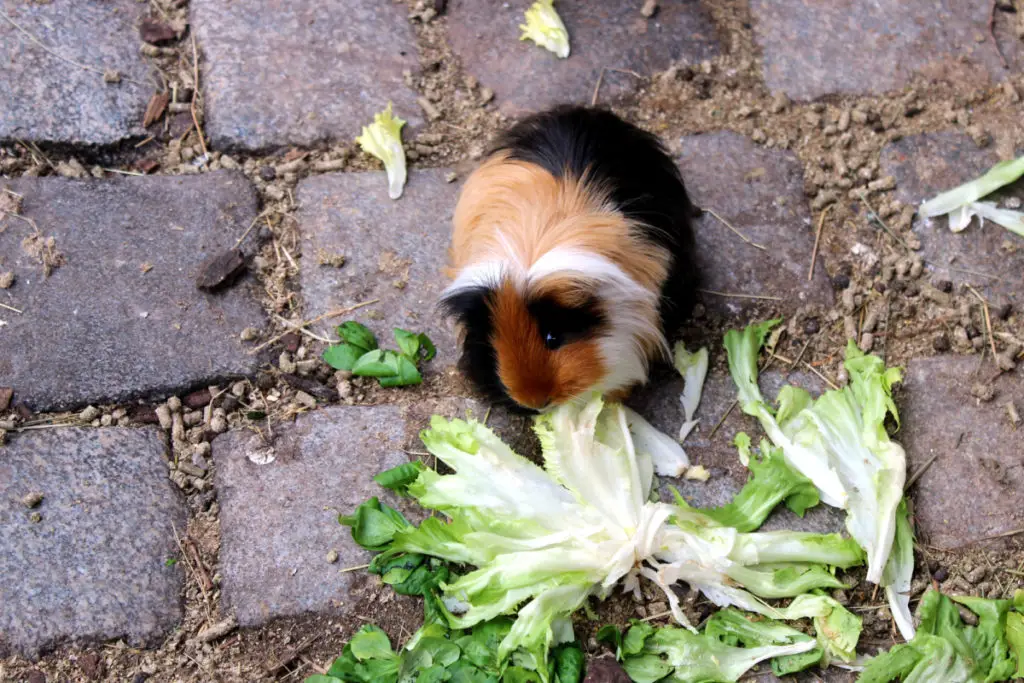Can Guinea Pigs Eat Celery Leaves? How To Prepare
You may be wondering, “Can guinea pigs eat celery leaves?”. If you are, then look no further because the answer is yes. Guinea pigs can eat and have celery leaves, which are most probably even better than the stalks we’re often familiar with feeding them.
Guinea pigs surprisingly love leafy vegetables. Since celery is a green leafy vegetable that’s not only delicious but also healthy, it would be better to introduce these celery leaves earlier to your little furry pets. (please read here how to introduce Guinea pig)
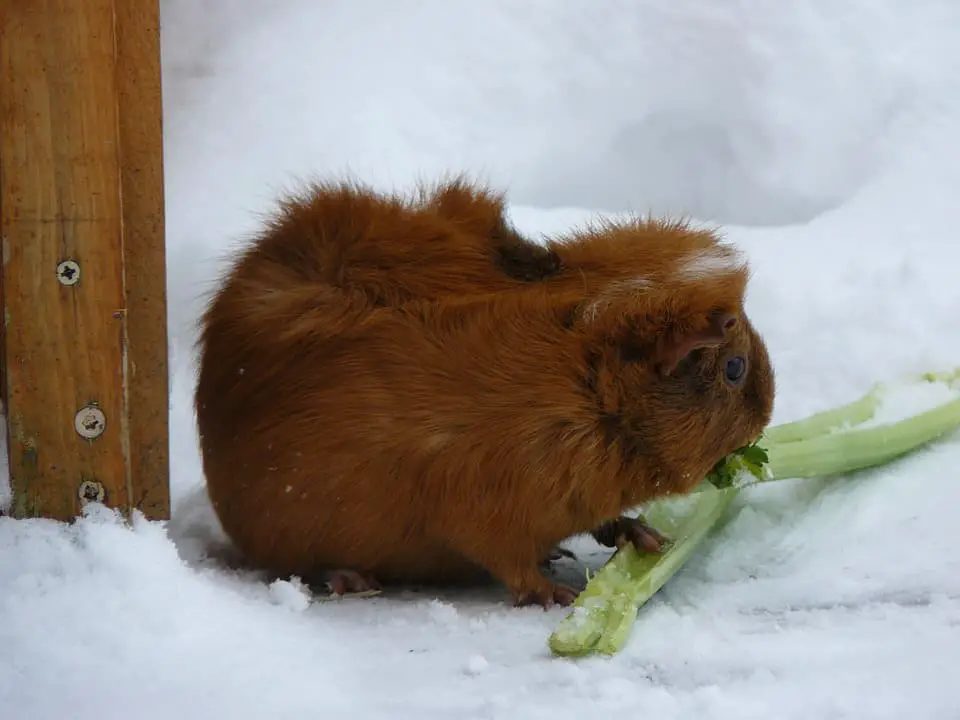
Your little fuzzy pet guinea pigs can eat celery, but only in small serving sizes. Moderation is vital when it comes to feeding your guinea pigs celery leaves, and also remember feeding them these green leafy vegetables occasionally and not frequently.
Health Benefits Of Feeding Pet Guinea Pigs Celery Leaves
Can guinea pigs eat celery leaves? Celery leaves are part of the healthy, green, and leafy celery vegetable. These leaves of celery surprisingly have many health benefits for your little pet guinea pigs.
A very noticeable health benefit would be its great low-calorie content. Here are the rest:
-
No free radicals
Celery leaves are rich in numerous nutrients and high levels of antioxidants. These antioxidants are highly responsible for the elimination of free radicals. Free radicals can gravely affect your pet guinea pig’s health, which is why celery leaves are so healthy and vital for their survival.
-
Better and faster water retention functionality
Guinea pigs often need help in storing water, which they need for survival. Celery leaves consist of extremely healthy components and substances and have excellent and fast water retention functionality to help your guinea pigs. (please read here why does my Guinea pig drink so much water)
-
Effective inflammation prevention
Apigenin is mostly a sole factor for inflammation prevention in guinea pigs. Celery leaves are also rich in apigenin, which is why these leaves can help in preventing inflammation for your fuzzy pets.
-
Balanced levels of low blood pressure
Guinea pigs are highly sensitive when it comes to their blood pressure. That’s why guinea pigs should maintain their balanced levels of low blood pressure at the optimum or ideal levels. That way, your pet guinea pigs can live long and healthy lives.
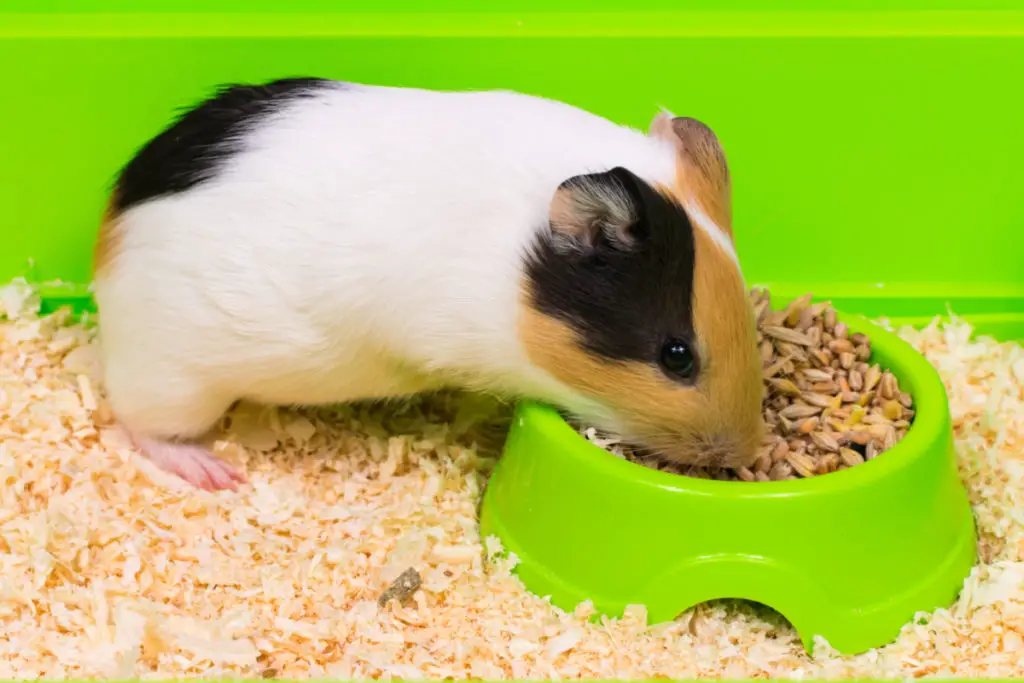
-
Improved neurogenesis
Neurogenesis is the development of cells as well as their growth in the body. What helps, strengthens, and highly improves this neurogenesis process is the Apigenin substance present in celery leaves.
-
Hyperlipidemia risk prevention
Hyperlipidemia is a highly dangerous condition where fatty molecules in the bloodstream increase by a large amount. Hyperlipidemia can immensely affect your pet guinea pigs’ heart health, which can most possibly even lead to fatality. However, the risks to your pet guinea pigs getting hyperlipidemia are possible to effectively lower due to celery leaves’ components.
-
Better digestive tract for guinea pigs
Digestive tract problems are common and often reoccurring complications for your pet guinea pigs. Therefore, celery leaves are vital because they help in the digestion process so your guinea pigs can have assistance when eating different foods. The aid comes from dietary fiber, which also helps to control various bowel movements.
-
Improves cardiovascular health
Cardiovascular health is improved, and the overall heart performs better because of the celery leaves’ vitamins. Celery leaves can help your guinea pigs have a healthier and stronger beating heart so they can live longer.
-
Improved lower risk of muscle spasms
Your pet guinea pigs can often suffer from intense and painful muscle spasms. These frequent muscle spasm pains usually occur due to a slight imbalance in their bodies. However, with celery leaves, these occurrences’ risk will immensely lower and reduce or even prevent.
What Are The Possible Risks In Giving My Guinea Pigs Celery?
Although celeries are probably one of the healthiest vegetables, it still has some factors that can prove quite risky to guinea pigs.
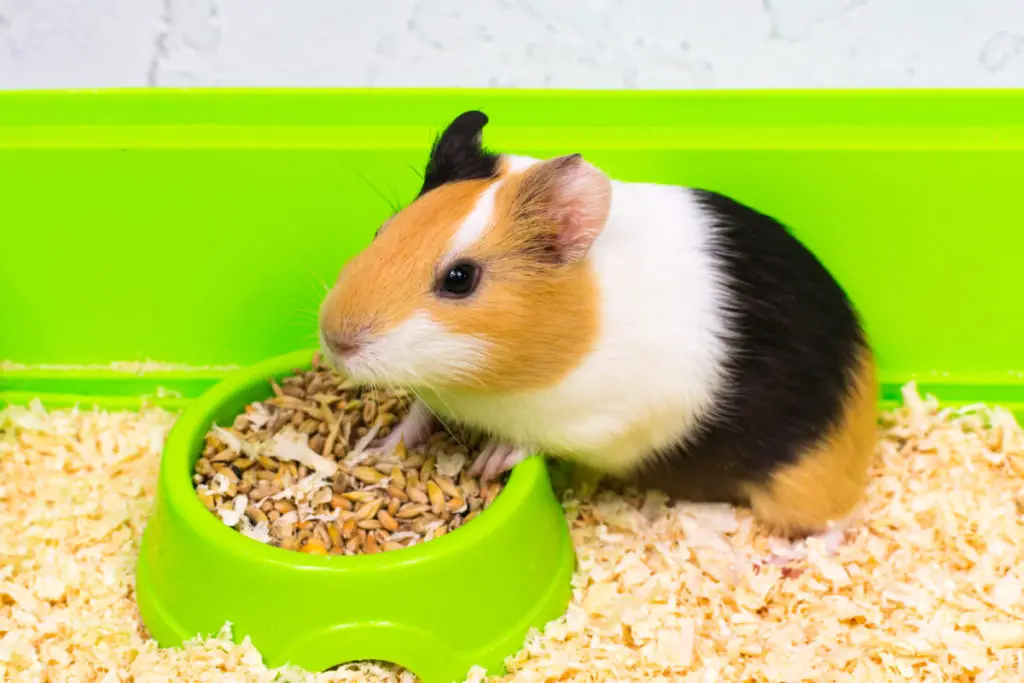
-
High levels of oxalates
Oxalates are compounds that can lead to several kidney problems. And worse? Guinea pigs were one of the animals most prone to urinary tract infections. Due to this, lessen the consumption of celery compared to regular consumption.
-
High amounts of sodium
Too much of everything will always harm you; that is why everything should be in moderation. A good example is a celery. This veggie has high sodium content, and too much sodium can make your little friend prone to sodium-induced diseases.
Celery has a pleasant taste that appeals to guinea pigs. But, your pet is a creature that depends on its owner for survival. That is why it is your sacred duty to take good care of it, and this involves getting rid of anything that can harm the pig.
-
Possible allergic reactions
Allergic reactions rarely happen to guinea pigs, and allergies to celeries are not an exemption. However, better safe than sorry! That is why when letting your pig have their first celery; it is crucial to keep a close eye on them. (please read here why do Guinea pig have red eye)
Oversee their reactions and if anything unusual happens, do not panic and let them drink water and discontinue the intake of celery. If symptoms persist, consult a veterinarian.
-
Diarrhea
Diarrhea is not an unusual guinea pig disease. It is because guinea pigs’ digestive system is limited and cannot process complicated food types. Some nutrients can be difficult for them to take in, especially when administered for the first time.
So, avoid overfeeding to let them digest food fully. When introducing food, it is vital to separate in small quantities to give them an allowance period for adjustment.
Can Guinea Pigs Eat Celery Stalks Or Sticks
Can guinea pigs eat celery stalks? The answer is yes. On the contrary, most guinea pig owners are used to feeding celery stalks to their pets because this is the most common part of the celery used for their meal.
However, although more common, celery stalks are surprisingly worse than celery leaves. Celery leaves are the better option to feed your pet guinea pigs because of their many health benefits and nutrition.
How about celery sticks; can guinea pigs eat them? First of all, celery sticks are simply another term for celery stalks. So, yes, you can safely and happily feed celery stalks or sticks to your pet guinea pigs, but remember to give them celery in moderation with small serving sizes and only occasionally.
Preparing Celery For Guinea Pig Consumption
Preparing the celery is as easy as 1,2,3! But, there are still chances that you might forget some things that you need to consider.
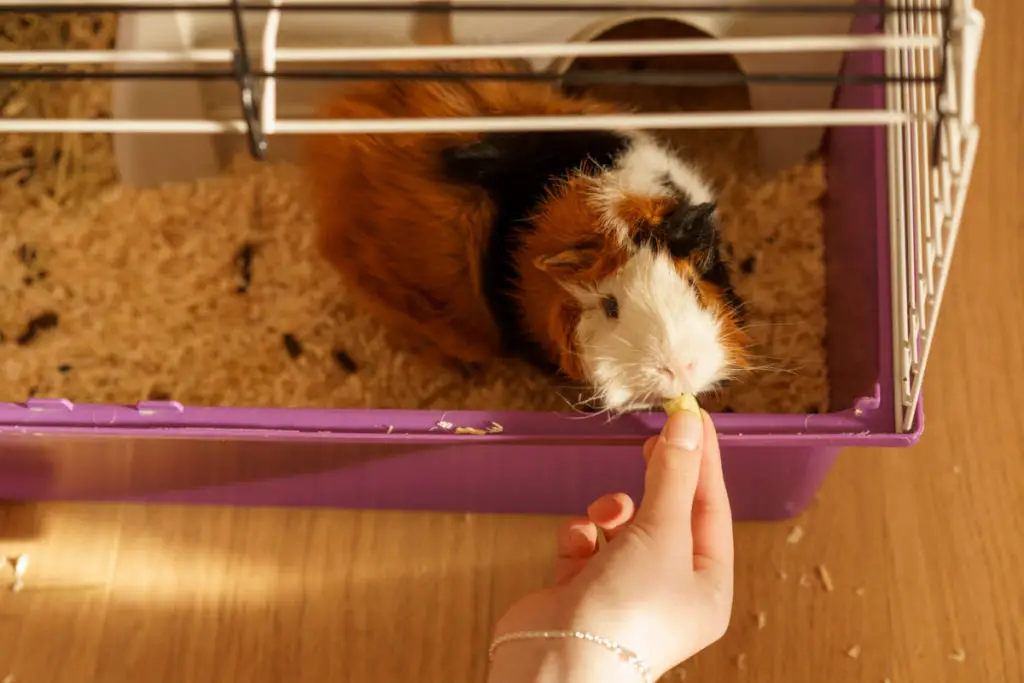
#1 Gathering
Gather your celery and make sure to choose the fresh and undamaged ones. It is the first step, so doing it right is crucial because all the other steps are dependent on it. Ruined celeries can reduce health benefits or, worse, affect your pig’s health.
#2 Washing and Separating
To assure the cleanliness of our veggie, rinse the celeries thoroughly with water. Make sure the stalks and leaves exposed are to water. Then, remove the stalks and set them aside. They aren’t appealing to guinea pigs, so it is preferred to get rid of them. (Please read here how to clean Guinea pig water bottle)
#3 Slicing
It is preferred to slice your celeries to make it easier for your little friend to eat and for easier digestion. Cut small bite-sized pieces before giving them to your pigs.
#4 Cleaning
Once they have finished eating, wipe the area with a clean cloth to eradicate possibilities of germs forming that can harm your guinea pig.
Conclusion
Can guinea pigs eat celery leaves? Celeries are vegetables packed with a healthy punch. With its numerous health benefits, it is an excellent choice to feed your guinea pig. Make sure to clean it well, and keep in mind all that you’ve read here. If you have, then you have nothing to worry at all!

